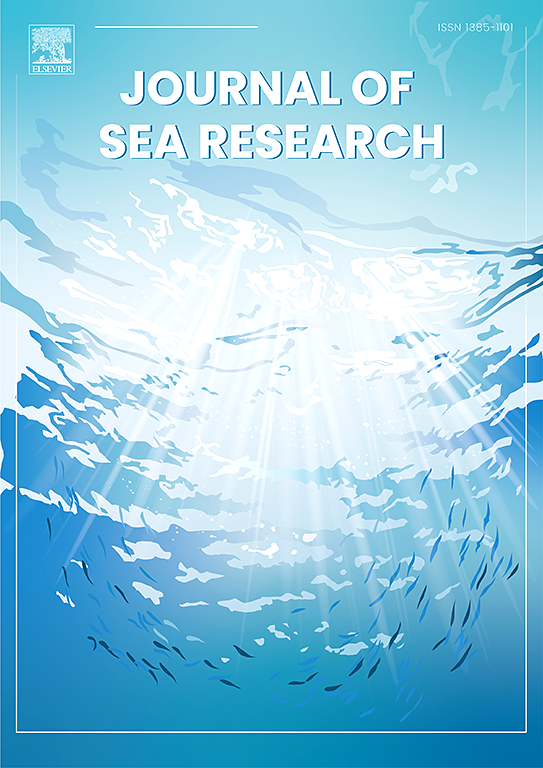Mussel reefs promote taxonomic biodiversity and host a unique assemblage of mobile marine fauna in a coastal area of poor ecological status
IF 2.9
4区 地球科学
Q2 MARINE & FRESHWATER BIOLOGY
引用次数: 0
Abstract
Coastal ecosystems worldwide face increasing anthropogenic pressures, with implications for the local ecological status and biodiversity. Using a temperate coastal ecosystem in poor ecological condition, this study revealed the importance of blue mussel (Mytilus spp.) reefs in supporting mobile marine fauna (e.g., fish). Using baited remote underwater video systems (BRUVS), we compared mobile marine fauna associated with A) high coverage mussel reefs in shallow and deeper parts of the area and B) corresponding low coverage soft-bottom sites. Our BRUVS findings demonstrate that blue mussel reefs harbor a higher taxonomic diversity of mobile fauna compared to the corresponding soft-bottom sites. Furthermore, the species community associated with mussel reefs exhibits distinct composition from the soft-bottom sites. Despite efforts to mitigate harmful eutrophication, the poor ecological status of the coastal ecosystem highlights ongoing challenges in coastal management. Our results have important implications for management of coastal resources and conservation of marine biodiversity. Despite its environmental challenges, the examined ecosystem serves as a representative case for many temperate waterbodies emphasizing the need for improved management outcomes. Incorporating mussel reef conservation and restoration into temperate water body management actions could enhance ecosystem resilience and local biodiversity in many coastal ecosystems subjected to anthropogenic pressures.
在生态状况不佳的沿海地区,贻贝礁促进了生物分类的多样性,并容纳了独特的海洋流动动物群落
全球沿海生态系统面临着越来越大的人为压力,对当地的生态状况和生物多样性造成了影响。本研究利用一个生态状况不佳的温带沿海生态系统,揭示了蓝贻贝(贻贝属)礁在支持海洋流动动物(如鱼类)方面的重要性。通过使用带饵远程水下视频系统(BRUVS),我们比较了与 A)该地区浅层和深层高覆盖率贻贝礁相关的移动海洋动物群,以及 B)相应的低覆盖率软海底点。BRUVS 的研究结果表明,与相应的软底层地点相比,蓝色贻贝礁中的移动动物具有更高的分类多样性。此外,与贻贝礁相关的物种群落的组成也与软底层地点不同。尽管为缓解有害的富营养化做出了努力,但沿海生态系统的不良生态状况凸显了沿海管理所面临的挑战。我们的研究结果对沿海资源管理和海洋生物多样性保护具有重要意义。尽管面临环境挑战,但所考察的生态系统是许多温带水体的代表性案例,强调了改善管理成果的必要性。将贻贝礁的保护和恢复纳入温带水体管理行动中,可以提高许多受到人为压力的沿海生态系统的生态系统恢复能力和当地的生物多样性。
本文章由计算机程序翻译,如有差异,请以英文原文为准。
求助全文
约1分钟内获得全文
求助全文
来源期刊

Journal of Sea Research
地学-海洋学
CiteScore
3.20
自引率
5.00%
发文量
86
审稿时长
6-12 weeks
期刊介绍:
The Journal of Sea Research is an international and multidisciplinary periodical on marine research, with an emphasis on the functioning of marine ecosystems in coastal and shelf seas, including intertidal, estuarine and brackish environments. As several subdisciplines add to this aim, manuscripts are welcome from the fields of marine biology, marine chemistry, marine sedimentology and physical oceanography, provided they add to the understanding of ecosystem processes.
 求助内容:
求助内容: 应助结果提醒方式:
应助结果提醒方式:


